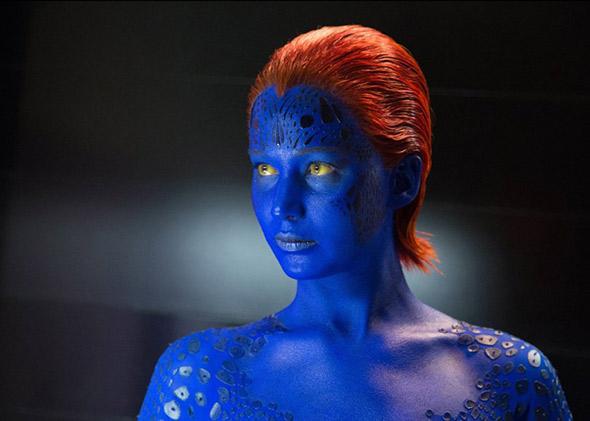It’s essentially impossible not to sense a certain queerness in anything from the X-Men universe; the fictional world’s core quandary of being born with a trait that, once you come out about it, can make you both a maligned freak and a prized resource (gay superpowers abound—just ask Larry Kramer) to the larger society is one with which LGBTQ people are all too familiar.
True to form, Bryan Singer’s rollicking, time-turning new entry to the series, X-Men: Days of Future Past, has its own queer preoccupations. For example, my colleague Dana Stevens identified a classic sublimated same-sex romance in her review: “It isn’t even quite right to say that the movie functions as an allegory about gay culture or gay rights—it’s more of a full-on gay romance, with every other relationship taking a backseat to the stormy lifelong bond that links the destinies of Erik and Charles [Magneto and Professor Xavier].” But watching the film myself, I was struck by a different queer theme, one that is somewhat less heartwarming than the squabbles and ultimate reconciliation of a literal power couple: Fear of queer blood, of the “special” nature of our DNA.
Of course, this is not new territory for the X-Men franchise: The 2006 film X-Men: The Last Stand focused on genetic-level “cures” for mutations, resulting in the weaponization of ex-mutant therapy. But in Days of Future Past, the question is not of simply curing difference (by choice or force), but of eradicating it entirely. The villain this time around is Dr. Bolivar Trask (played by a wonderfully smug Peter Dinklage), a coldly brilliant scientist whose work focuses on identifying and exploiting the genetic foundations of mutation so that their possessor can be marked for capture and/or termination. Trask’s research eventually produces the Sentinels, a breed of mutation-sniffing, rapidly adapting super robots whose sole mission of killing any carrier of a mutation—or the potential for it in their offspring—leads to a very bleak future indeed.
For anyone who has thought for more than a few minutes about the ongoing hunt for a “gay gene” or broader genetic basis for homosexuality, this narrative should give pause. While it’s unlikely (though not unimaginable, given events in certain parts of the world) that gay-hunting death machines would be constructed on the basis of such a discovery, it is not at all impossible that parents or, indeed, whole governments, might decide to use the knowledge to abort or otherwise prevent the birth of gay children. And really, isn’t a coolly delivered test result and subsequent “procedure” in some ways more terrifying than a fire-breathing automaton? The AIDS epidemic already wiped out much of a generation of gay men—but the discovery of a gay gene could, if handled carelessly, preclude the possibility of more of any gender.
Days of Future Past’s exploration of queer genetics doesn’t stop there. It’s worth noting that Trask is a dwarf—technically speaking, he is the carrier of a certain kind of mutation himself. The film does not give Trask much of a backstory, allowing us to guess at what, besides the desire for fame and success, drives his single-minded pursuit of mutant annihilation. Interpreting his motivation through the lens of internalized homophobia does not seem like a stretch—as we know all too well, some of the most vicious anti-gay demagogues are those with the widest of stances.
Some character in the X-Men movies always seems to offer the truism that “people are afraid of what they don’t understand.” This is especially true when the lack of understanding brushes uncomfortably against the self; after all, mutation—whether it be for supersonic speed or sexual attraction—is an equal opportunity visitor. But the vision of Days of Future Past is one in which we simultaneously understand too much and too little. The blood-borne signature of difference has been located, and that understanding produces not an increased comfort, but a desire to destroy. Of course, it doesn’t have to be this way—but the thing about the future is that it has a habit of coming before you realize what’s happened. And contrary to fiction, fixing it isn’t so easy.
